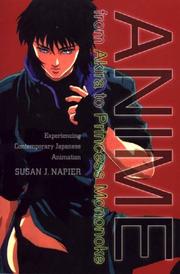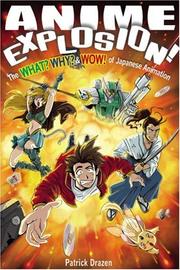| Listing 1 - 10 of 93 | << page >> |
Sort by
|

ISBN: 0312238630 0312238622 Year: 2001 Publisher: Basingstoke Palgrave
Abstract | Keywords | Export | Availability | Bookmark
 Loading...
Loading...Choose an application
- Reference Manager
- EndNote
- RefWorks (Direct export to RefWorks)
With the popularity of Pokemon still far from waning, Japanese animation, known as anime to its fans, has a firm hold on American pop culture. However, anime is much more than children's cartoons. It runs the gamut from historical epics to sci-fi sexual thrillers. Often dismissed as fanciful entertainment, anime is actually quite adept at portraying important social and cultural issues such as alienation, gender inequality, and teenage angst. This book investigates the ways that anime presents these issues in an in-depth and sophisticated manner, uncovering the identity conflicts, fears over rapid technological advancement, and other key themes present in much of Japanese animation.
Anime --- Animated films --- J6848 --- Japan: Media arts and entertainment -- anime
Book

ISBN: 9789048525669 9789089647733 Year: 2020 Publisher: Amsterdam
Abstract | Keywords | Export | Availability | Bookmark
 Loading...
Loading...Choose an application
- Reference Manager
- EndNote
- RefWorks (Direct export to RefWorks)
This collection of essays explores the development of electronic sound recording in Japanese cinema, radio, and popular music to illuminate the interrelationship of aesthetics, technology, and cultural modernity in prewar Japan. Putting the cinema at the center of a "culture of the sound image", it restores complexity to a media transition that is often described simply as slow and reluctant. In that vibrant sound culture, the talkie was introduced on the radio before it could be heard in the cinema, and pop music adaptations substituted for musicals even as cinema musicians and live narrators resisted the introduction of recorded sound. Taken together, the essays show that the development of sound technology shaped the economic structure of the film industry and its labour practices, the intermedial relation between cinema, radio, and popular music, as well as the architecture of cinemas and the visual style of individual Japanese films and filmmakers.
Motion pictures --- J6839 --- History --- Japan: Media arts and entertainment -- cinema
Book
ISBN: 9780739190920 9780739190937 0739190938 073919092X Year: 2015 Publisher: Lanham Lexington books
Abstract | Keywords | Export | Availability | Bookmark
 Loading...
Loading...Choose an application
- Reference Manager
- EndNote
- RefWorks (Direct export to RefWorks)
Book
ISBN: 9780415530408 9780415530415 9780415530422 9780415530439 9780415530392 0415530393 0415530407 0415530415 0415530423 0415530431 Year: 2015 Publisher: London Routledge
Abstract | Keywords | Export | Availability | Bookmark
 Loading...
Loading...Choose an application
- Reference Manager
- EndNote
- RefWorks (Direct export to RefWorks)
Motion pictures --- J6839 --- J6848 --- History --- Japan: Media arts and entertainment -- cinema --- Japan: Media arts and entertainment -- anime --- Cinéma --- Cinéma japonais --- Histoire et critique.
Book
ISBN: 9781441116819 9781441133274 1441116818 1441133275 Year: 2011 Publisher: New York, N.Y. Continuum
Abstract | Keywords | Export | Availability | Bookmark
 Loading...
Loading...Choose an application
- Reference Manager
- EndNote
- RefWorks (Direct export to RefWorks)
Focusing on the period 1930-1960, Catherine Russell demystifies classical Japanese cinema. The book provides in-depth analysis of gender and social politics in 15 landmark films.
Film --- Japan --- Motion pictures --- History --- J6839 --- Japan: Media arts and entertainment -- cinema --- Cinéma -- Japon

ISBN: 1880656728 Year: 2003 Publisher: Berkeley Stone Bridge Press
Abstract | Keywords | Export | Availability | Bookmark
 Loading...
Loading...Choose an application
- Reference Manager
- EndNote
- RefWorks (Direct export to RefWorks)
Anime --- J6848 --- Japan: Media arts and entertainment -- anime --- Animated films --- Drawing --- beeldverhalen
Book
ISBN: 0870115073 4770010052 Year: 1982 Publisher: New York Kodansha International
Abstract | Keywords | Export | Availability | Bookmark
 Loading...
Loading...Choose an application
- Reference Manager
- EndNote
- RefWorks (Direct export to RefWorks)
Motion pictures --- Cinéma --- J6839 --- Japan: Media arts and entertainment -- cinema --- Cinéma

ISBN: 9780415328470 0415328470 9780415328487 0415328489 9780203374641 9781134334179 9781134334216 9781134334223 1134334222 1134334214 9786611062514 1281062510 0203374649 Year: 2008 Publisher: London Routledge
Abstract | Keywords | Export | Availability | Bookmark
 Loading...
Loading...Choose an application
- Reference Manager
- EndNote
- RefWorks (Direct export to RefWorks)
A collection of 26 articles on key films of Japanese cinema, from the silent era to the present day. All the major directors of Japanese cinema will be covered, from Ozu and Kurosawa to contemporary directors like Kitano and Itami. Films discussed include classics like "Seven Samurai" and "In the Realm of the Senses" as well as cult favorites such as "Godzilla" and more recent successes such as "Hana-Bi", "Tampopo" and "Spirited Away". Each chapter will discuss a film in relation to particular aesthetic, inductrial or critical issues and will end with a guide to further reading and a complete filmography for the relevant director. The volume will feature a comprehensive introduction to Japanese cinema history and Japanese culture and society by the editors. All of the films examined are all available on DVD and video. This book follows the same format as our successful supplementary French Film: Texts and Contexts, which we published in a second edition in 1999.
Film --- Japan --- J6839 --- -Cinema --- Japan: Media arts and entertainment -- cinema --- Motion pictures --- Cinéma
Book
ISBN: 9781844576791 9781844576784 1844576795 1844576787 Year: 2020 Publisher: London Bloomsbury
Abstract | Keywords | Export | Availability | Bookmark
 Loading...
Loading...Choose an application
- Reference Manager
- EndNote
- RefWorks (Direct export to RefWorks)
"The Japanese Cinema Book provides a new and comprehensive survey of one of the world's most fascinating and widely admired filmmaking regions. In terms of its historical coverage, broad thematic approach and the significant international range of its authors, it is the largest and most wide-ranging publication of its kind to date. Ranging from renowned directors such as Akira Kurosawa to neglected popular genres such as the film musical and encompassing topics such as ecology, spectatorship, home-movies, colonial history and relations with Hollywood and Europe, The Japanese Cinema Book presents a set of new, and often surprising, perspectives on Japanese film. With its plural range of interdisciplinary perspectives based on the expertise of established and emerging scholars and critics, The Japanese Cinema Book provides a groundbreaking picture of the different ways in which Japanese cinema may be understood as a local, regional, national, transnational and global phenomenon. The book's innovative structure combines general surveys of a particular historical topic or critical approach with various micro-level case studies. It argues there is no single fixed Japanese cinema, but instead a fluid and varied field of Japanese filmmaking cultures that continue to exist in a dynamic relationship with other cinemas, media and regions."--
Motion pictures --- History --- History. --- J6839 --- Japan: Media arts and entertainment -- cinema
Periodical
ISSN: 07797737 Publisher: Gent Japan communication.
Abstract | Keywords | Export | Availability | Bookmark
 Loading...
Loading...Choose an application
- Reference Manager
- EndNote
- RefWorks (Direct export to RefWorks)
| Listing 1 - 10 of 93 | << page >> |
Sort by
|

 Search
Search Feedback
Feedback About UniCat
About UniCat  Help
Help News
News